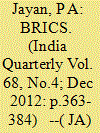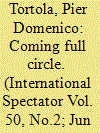| Srl | Item |
| 1 |
ID:
117617


|
|
|
|
|
| Publication |
2012.
|
| Summary/Abstract |
In the era of regional international relations and more interdependence, organisations like the Brazil, Russia, India, China and South Africa (BRICS) can play a meaningful role in international level as well as regional in years to come. The recent summit of the BRICS reiterates that more cooperation is needed at various levels. In Delhi declaration, it is called for a more representative international financial architecture, with an increase in the voice and representation of developing countries and the establishment and improvement of a just international monetary system that can serve the interests of all countries and support the development of emerging and developing economies. Moreover, these economies having experienced broad-based growth are now significant contributors to global recovery. This is true. One must acknowledge the fact that the roles of the BRICS countries are composed of various political systems, various subcontinent, but in the changed context, all these countries are coming under the purview of the 'developing countries' in broader terms. That makes the BRICS beyond the regional boundaries to set a benchmark in the regional cooperation. China's permanent status in the United Nations makes the BRICS more strategically oriented and pragmatic aspects of foreign policy engagement in the twenty-first century. The political leadership and vision is equally important with economic engagement. The four major theories of the international relations (IR) are striking in this respect which includes liberalism, realism, constructivism and Marxism. Theoretical framework relevant to regionalism in focusing on IR theories is also analysed in this article. The main argument of the article is that there is no prescribed regional model and BRICS has to tune to the member countries' regional and political frameworks to engage with. Therefore, the framework of analysis is more or less critical about the Western engagement and it is region focused.
|
|
|
|
|
|
|
|
|
|
|
|
|
|
|
|
| 2 |
ID:
139619


|
|
|
|
|
| Summary/Abstract |
Europe’s woes mark a new chapter in the longstanding theory/history nexus in European studies. The euro crisis has brought integration theory back onto the scholarly agenda and highlighted the value of neo-functionalism – and more precisely its key ‘spillover’ mechanism – as a framework for interpreting current politico-institutional dynamics in the European Union. We are, however, at a particular point of the neo-functionalist narration, in which the transition from low to high political integration has opened a phase of political fluidity that makes ideas and political leadership crucial in determining the future course of integration. In this phase, the positive scheme of neo-functionalism and the normative one of federalism come together, bringing the intellectual trajectory begun after WWII to full circle. Whether this new encounter will result in further integration depends primarily on the content of new federalist ideas, the emergence of an effective European leadership, and the presence of a favourable international environment. For all three factors, the record so far has been mixed at best.
|
|
|
|
|
|
|
|
|
|
|
|
|
|
|
|